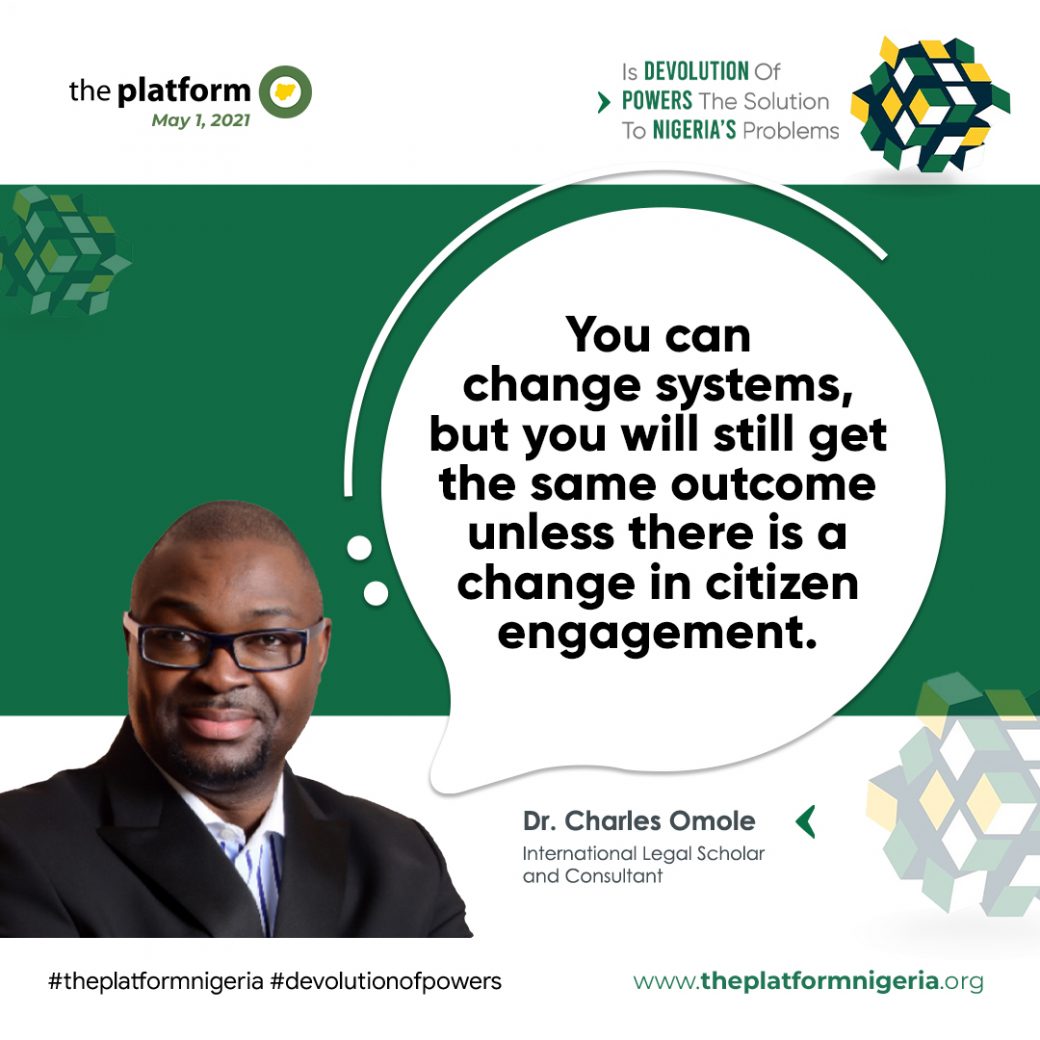Stating how he is excited about the topic of the platform, Dr Charles Omole a security expert and third speaker at The Platform Nigeria defined devolution as ‘administrative decentralization’. He stated his intent to tell briefly 3 stories that will conceptualize the whole idea behind his message. In 1960 Nigeria had three levels of security, National Police, Regional Police and Local Police. There were so many allegations and reports written against the police with respect to their wrong practices. These reports are still valid today.
The President was advised to centralise the Police force. We moved from three tiers of police to centralised system but the allegations didn’t stop. We changed the system but didn’t change people. “Unless there is citizen engagement, there will never be any laudable change”, he pointed out.
His second story was about some Harvard Professors who were brought to deliberate on economic practices and stop communism in order to embrace the market system and get rid of state monopoly. State enterprises were sold off to destroy state monopoly yet the outcome didn’t change.
The third story he told was about South Sudan, who fought war for many years requesting a separation between the Christian clan (South Sudan) and the Muslim Clan (North Sudan). They fought war for many years to get rid of the northern sudanese who are Muslims and eventually won. However, amongst the christain independent nation there is still war of the different factions.
Systems are less important compared to the people who eventually control them, he reiterated. As long as the people are wrong the system cannot be effective.
He continued by saying that devolution of power gets decision making closer to the people. In theory, devolution of power can be beneficial. There is no point changing a system if the players don’t change. An unchanged people will mess up any good system, Dr Omole further emphasised.
He pointed out that the issue isn’t the system but the nature of the people left to manage it. The current constitution has an element of devolution. But, how well are we using it? True citizen participation doesn’t exist without reflective refresh of leadership. True citizen participation is reflected in change of leadership not in the number of people who go to vote. When we keep having a constant pool of choice of leaders to choose from, there is no true citizen participation.
To further drive home his point, Dr. Omole explained how Nigerians don’t get involved in politics and the cheapest place to get involved is the local level. We must be involved in politics to ensure that our outcry for devolution doesn’t end up with us having the same set of leaders entrusted with powers.
We must see beyond headlines and embrace details. the devil is in the details, Nigerians focus on headlines only, unbeknownst to them that it goes beyond a single individual.
Devolution doesn’t mean better governance if we don’t get into the details. if devolution will become successful we must move beyond headline culture. We need competency and capacity at the lowest end of the government. The calibre of people at the grassroots are thugs at touts and it ought not be. We the youths must ask ourselves how many of us are involved in politics at the grassroot level.
We must start engaging from grassroot level. He noted that to be a councillor, you require only 500 votes, but people won’t embrace that; all they are fighting for is a seat at the presidency. For devolution to work, we need more competent people at the grassroot and local level. And that is easier to achieve. In Nigeria, local political power directorates have failed to itemise solutions they are providing to the commoners.
Speaking about the governors, he said that those who make the local government moribund cannot claim to support ethnic separation. They can’t claim they want devolution as they haven’t even devolved power in their states.
It’s important we understand that if we don’t ask these detailed questions, we will be repeating monopoly. It’s better to fight one powerful devil than 37 powerful devils. Those clamouring for devolution of powers should practise it first.
Nigerians can’t ask for devolution of power and focus all effort on national politics. All our interests must move from centre to local level. Know your ward councillors who are the house of assembly at local level. Devolution is bringing power to the lowest level.
For it to work in Nigeria it’s not about transfer of control of power to the state but having our best of minds at the local level. There are lots of differences we can make at the local level. It’s a goal for better governance and a means of achieving it.
He pointed out that the effect of devolution is participation. We need to stop standing by the arena and allow current players to run the show. The only way this can work is for us to be effectively engaged.
Our goal cannot be the devolution of power but the evolution of a new crew of players, new politicians, new kinds of people in the arena. Unless those clamouring for devolution are ready to play at local level, they are only ticking time bombs.
Europe has a centralised police system and the USA has a decentralised system. Both are working, hence there is no good or bad system, only bad players. Focusing only on the president is misdirection. The razzmatazz around politics in Nigeria is to distract people from the core which is the local level.
Devolution is a long term project and must be done the right way. It’s not easy to change people’s mind. Playing the politics of difference isn’t the way to go as it will continue at every level and there will be no peace. He concluded.
Finally, he revealed that the real problem of Nigeria is not the politicians but the civil servants as they are ones with the capacity to turn a good politician to a very bad one. However people don’t know and so they are focusing on the politicians. It’s those in civil service who hate modernization and will truncate every effort of anyone to change their system. He closed.

